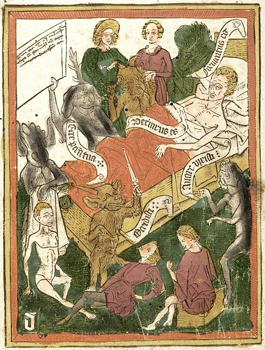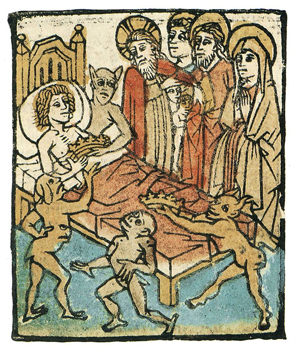From Our Archives
Debie Thomas, Beasts and Angels (2021); Into the Wild (2018).
For Sunday February 11, 2024
First Sunday in Lent
Lectionary Readings (Revised Common Lectionary, Year B)
Genesis 9:8-17
Psalm 25:1-10
1 Peter 3:18-22
Mark 1:9-15
This Week's Essay
This week presents a crazy quirk of the calendar for believers. After all the hype of Super Bowl Sunday on February 11, the sentimentality of Valentines Day and the season of Lent both begin on Ash Wednesday February 14.
Since the fourth century, Christians have observed the 40 week days before Easter as a period of reflection, repentance, fasting, abstinence, and acts of mercy. In particular, we're encouraged to contemplate the inevitability of our death—memento mori.
In the Bible, forty is a number of sacred significance. The Flood in this week's readings from Genesis 9 and 1 Peter 3 lasted forty days and forty nights. Israel wandered in the wilderness for forty years. Moses spent forty days and nights on Mt. Sinai. Jonah preached to Nineveh for forty days. And in the gospel of Mark this week, Jesus spent forty days in the desert fasting, praying, and battling satan ("the accuser").
 |
|
Ars Moriendi ("The Art of Dying"), 15th century.
|
On Ash Wednesday the priest imposes ashes on my forehead to remind me of my mortality. To each and every worshipper, one by one, she recites God's words to Adam in Genesis 3:19, “for dust you are, and to dust you will return.” These brutally realistic words from three thousand years ago stand in stark contrast to the archetypal lie that Satan told Eve, and the denial that flourishes today: "surely you will not die!"
Ash Wednesday is thus "the most honest of days," says Sara Miles in her book City of God, because it's a day when the church reminds us of what our culture denies, and what no one else will tell us—that our days are limited, and that we've made a mess of things. The hard truth of Lent is thus a blessing because it deconstructs our lies and tells us the truth. Lent helps us to live in reality.
To "remember death" has always been standard pastoral wisdom in the church. In his famous Rule that was written around 530 CE, to take one of many possible examples, St. Benedict advised his monks to "see death before one daily."
 |
|
Ars Moriendi ("The Art of Dying"), 15th century.
|
In the fifteenth century, in the dark shadows of the Black Death and the Hundred Years' War that decimated Europe, a whole genre of literature emerged on "The Art of Dying." These manuals advised readers how to die well, and instructed clergy on how to help them do that. Famous for their woodcuts, they were enormously popular, and lasted into the eighteenth century. One version even went through 100 editions.
Today, things are different. In 1974 the cultural anthropologist Ernest Becker won the Pulitzer Prize for his book The Denial of Death.
Similarly, in his book Being Mortal the surgeon Atul Gawande argues that America is a culture in denial about death. Our doctors have reduced death to a "purely medical experience," which in turn does tremendous harm to people. Conversely, says Gawande, acknowledging your mortality is a tremendous gift. It reorders your desires. It narrows your focus, and gives you a new perspective that's rooted in reality instead of vain hope for a medical miracle.
Gawande observes how elderly people often shift their life priorities to being rather than doing, to giving rather than getting, to friendships rather than accomplishments, to family rather than work, and so on—a shift that we acknowledge is a healthier way to live.
In his posthumous memoir Mortality, the atheist Christopher Hitchens described his dying days with remarkable candor—feelings of impotence, oppression, resignation, unbearable physical pain, humiliation, and vulnerability. He meditates on the poetry of TS Eliot: "I have seen the moment of my greatness flicker, / And I have seen the eternal Footman hold my coat, and snicker; / and I am afraid." As for Philip Larkin's famous poem Aubade, with its terrifying description of fear in the face of death, Hitchens describes it as an implied reproof of stoicism, and then concludes: "atheists ought not to be offering consolation either."
 |
|
Ars Moriendi ("The Art of Dying"), 15th century.
|
In her book Smoke Gets In Your Eyes and Other Lessons from the Crematory, Caitlin Doughty aims to "look mortality straight in the eye," based upon her years working as a mortician. In her view, "death should be known. Known as a difficult mental, physical, and emotional process, respected and feared for what it is." (her emphasis).
Doughty would disrupt our "polite complacency" about a taboo topic. "When you know that death is coming for you, the thought inspires you to be ambitious, to apologize to old enemies, call your grandparents, work less, travel more, learn Russian, take up knitting. Fall in love." Which is to say, we can live a better life if we think more intentionally about death.
So, we "remember death" in order to affirm life. Meditating on mortality helps me to live more fully in the present moment. Lent begins on Ash Wednesday, moves toward Good Friday, then culminates on Easter Sunday. From there, as Peter preached in his post-resurrection sermon, we wait "until the time comes for God to restore everything."
I love Lent. It's an entirely positive exercise, and believers are the ultimate optimists. Lent reminds me that I don't need to be stuck in old ways of thinking and acting. Change and renewal are possible. I can wipe the mud off my glasses. Hit the reset button. I don't need to wait for old age to magically impart a new perspective on what matters most and why. So, as I kneel at the altar on Ash Wednesday, I'm grateful for the priest to rub the ashes on. Rub them on hard.
Weekly Prayer
From Saint Ephraim of Syria (4th century):
O Lord and Master of my life,
take from me the spirit of sloth, despair, lust of power, and idle talk,
but grant rather the spirit of chastity, humility, patience, and love to Thy servant.
Yea, O Lord and King,
grant me to see my own transgressions and not to judge my brother,
for blessed art Thou, unto ages of ages. Amen
Dan Clendenin: dan@journeywithjesus.net
Image credits: (1) De.MittelAlter.Wikia.com; (2) Wikipedia.org; and (3) Wikipedia.org.





